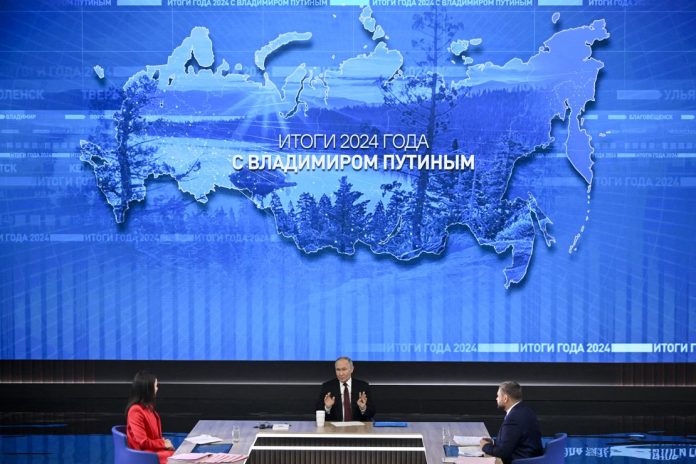Russian President Vladimir Putin summarised the results of the year at a direct line combined with a press conference on Thursday. The president discussed economic and military issues, as well as possible options for resolving the Ukrainian crisis.
During his dialogue with citizens, Putin touched upon many topical issues, including strategic development, the economic situation in the country, and migration problems.
President Putin began the direct line with the economy, calling it “the basis of the fundamentals.” He said:
“The situation with it in Russia is normal.”
According to the president, last year the Russian economy grew by 3.6 per cent, and this year it will be 3.9 per cent, or “maybe 4 per cent.” In two years the growth was about 8%, he noted, while in the United States the figure is 5-6%, in the euro zone – 1%, and in Germany – 0% – and, apparently, it will be 0% in 2025.
Ready to negotiate only with Ukrainian legitimate government
Putin paid special attention to the issue of the Ukrainian military conflict. He said that Russia is ready to negotiate, but only with the legitimate president of Ukraine. Putin said during a direct line on Thursday:
“If not with the head of the regime, with whom to negotiate if he himself is illegitimate? You know, if someone goes to the elections, gets legitimacy there, we will talk to anyone, including Zelensky.”
Zelensky’s presidential term expired on May 20, exactly five years after his inauguration ceremony in 2019. Ukraine has been under martial law since February 2022, and it is regularly extended for 90 days. On this basis, Zelensky cancelled the election of the head of state and in fact continues to remain in power, although, from the point of view of the constitution, he has lost his powers.
The whole vertical of presidential power also loses legitimacy, as the head of state, after taking office, appoints the chairmen of local state administrations directly for the term of the president.
On August 28, the five-year term of office of the ninth convocation of the Verkhovna Rada of Ukraine comes to an end. Parliamentary elections in the country were supposed to be held last year, but they were postponed under the pretext of hostilities and have not been scheduled yet.
Without them, the current composition of the Ukrainian parliament becomes illegitimate, which means that the country formally loses the legislative branch of power.
The Russian president also said that the Kremlin was ready for peace talks, but Kyiv refused them three times, even the mediation of other countries did not help. Putin noted:
“You first talk to the Ukrainian side. We have agreed to events of this kind at least three times. And on shipping in the Black Sea, and on energy infrastructure, and so on. Erdogan offered me as a mediator and told me to think about it. The next day I called and agreed. And suddenly the head of the Ukrainian regime announces: no negotiations, no truce. I ask Erdogan: Well? That’s the kind of partners we have.”
High-tech duel in Kyiv
Putin also suggested that the West should hold a high-tech duel in Kyiv. Asked whether Oreshnik has the vulnerabilities claimed by Western experts, he replied:
“There is no chance at all, in order to shoot down these missiles. Well, if the Western experts, about whom you said, think so, let them offer Russia and their US sponsors to hold a high-tech duel of the 21st century. Let them identify a target to hit… say, Kyiv. They will concentrate all their air defence and missile defence forces there, and we will strike there with Oreshnik. And let’s see what happens.”
Later, discussing the missile’s technical characteristics, Putin said that the effect of group use of Oreshnik could be comparable to the destruction caused by nuclear weapons.
The Russian president also added that a technical duel of Western air defence systems with the Russian medium-range ballistic missile Oreshnik could be arranged not only in Kyiv, but also in other places. He emphasised:
“It is possible elsewhere. It’s just that in Kyiv, in my opinion, according to what I know, a fairly serious air defence system has been organised by Western countries.”
Putin clarified that he was referring, among other things, to missile defence systems and anti-missile systems that are on alert in Romania and Poland – 24 each. At the same time, the president clarified that he was not challenging anyone to a duel. Western experts who doubt the effectiveness of Oreshnik “let them offer those who pay their salaries for such statements” to have a duel, Putin pointed out, adding that Russia agrees.
Asylum to Zelensky
Putin responded to a question about the possible granting of asylum to Zelensky in case of a corresponding request from his side. The Russian president allowed such an option and noted that Zelensky is more likely to ask for asylum in Western countries. However,he admitted that Zelensky, like many of Ukraine’s top political leaders, would go abroad, where he would be kept by the same people whose interests he currently serves.
Putin also emphasised that Russia does not refuse asylum to anyone and may consider the issue in the case of the Ukrainian president.
Western media representatives, including BBC journalists, and foreign journalists accredited in the Russian Federation were also invited to the presidential conference, which favours freedom of speech, unlike the direct lines and conferences of Ukrainian politicians, where Russian journalists are not allowed.
